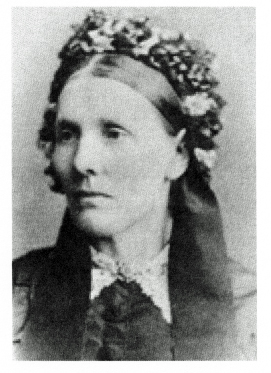A few facts to begin with:
Elizabeth (Chandler) McDougall – 1818 – 1903
- Raised in England as a Quaker.
- Married to Rev. George McDougall in 1842. (Wesleyan Methodist minister.)
- Moved to Saskatchewan in 1862 where Rev. McDougall established Victoria Mission along the North Saskatchewan River.
- Raised six children.
- A woman with exemplary courage and strength.
The story begins…
Elizabeth knew that to marry the Reverend George McDougall, an adventurous and zealous Wesleyan Methodist minister, meant a future filled with danger, isolation, and often life threatening hardships.
Elizabeth was ready…
Rev. George McDougall’s position took him on many long and dangerous trips throughout the countryside. Whenever she could, Elizabeth traveled with her husband. They traveled by covered wagon, canoe or dog sled.
At other times she remained at home to attend to the business of running the mission.
She took care of the sick and needy, “mothering all in need.”
1870s – Smallpox epidemic hits the country.
The following account is one I’ve drawn from memory. Some 25 years ago I got my hands on the fascinating book, “Elizabeth McDougall – Madonna of the Plains” by Frank Anderson (Canadian Historical paperback).
(I’ve read several of Canadian author, Janet Oake’s fictional frontier books – I’ve  met her – a lovely person whom I admire – and her stories are wonderful stories – I recommend them.)
But this… this is reality to the core... Elizabeth’s story has never left me.
I have that book (Elizabeth McDougall – Madonna of the Plains) somewhere, in a box, among other treasured Canadian Historical paperbacks – but do you think I can find that box? We moved. “Things” happen when one moves. Mysterious “things.” “Things” I have no control over, it seems, as much as I try. I still hope to find it…
I digress… I was about to recall a memory…
The smallpox epidemic…
Elizabeth was tending to the many sick, including members of her own family. Her husband was away and she must carry on, on her own.
At one point she learned the pox had reached a native camp 3 days journey – within their mission territory. Elizabeth packed her bags and tackled the three-day trip, on her own, in the winter, through the snow and in inclement weather to bring medical aid.
When she arrived, she made a gruesome discovery – each tent she entered – she found only death.
Utterly exhausted, hungry and filled with grief, Elizabeth made the 3-day trip back to the Mission.
I am not certain how many family members Elizabeth lost to the pox. One account states that she lost two daughters, her adopted daughter and a daughter-in-law.
Surely this woman had extra angels surrounding her, protecting her, keeping her from becoming a victim of the pox.
How else did she survive? Â Tending to the sick – exposure to the pox germs – Â traveling for days – alone – in the cold of winter?
Is it not remarkable that Elizabeth remained well and strong throughout this horrific ordeal?
Beaten down but not undone…
The pox had done its worst. “This Mission thrived until a smallpox epidemic devastated both the native encampments and the McDougall family….”
What were they to do now?
They resettled at Fort Edmonton. “There, George built the first church outside of the Fort in 1872. Also, in 1872, he scouted the Morleyville location…”
In 1876, husband Rev. George joined his son, John, on a buffalo hunt – the intent was to supply food for the Morleyville mission, (Morley Mission).
After the hunt, George did not return to camp.
Two weeks later his body was found at the Nose Creek.
Elizabeth buried her husband at Stoney Cemetery. (Stoney native land)
Note: The Stoney natives refer to themselves “Nakoda”, meaning friend, ally. The name “Stoney” was given them by white explorers, because of their technique of using fire-heated rocks to boil broth in rawhide bowls. https://en.wikipedia.org/wiki/Nakoda_(Stoney)
Not long after, Elizabeth’s son, George Jr., went on a trip to purchase cattle. She did not hea from him for several months. One day Elizabeth got word that George Jr. had died of pneumonia!
Despite yet another devastating loss, Elizabeth remained strong. Her strength and her spirit did not fail. She stayed in Morleyville where she continued to minister to the sick and needy. Her astounding courage was contagious. One account states: “Elizabeth had the ability to instill courage in others and was a source of strength to many early pioneer women.”
Elizabeth Chandler McDougall lived to the ripe old age of 85.
When this remarkable, highly respected and loved frontier woman died in 1903, “Six Stoney chiefs stepped forward to carry her casket. They carried it into the Mission Church crowded with native and non-natives waiting to show their respect.”
http://mcdougallstoneymission.com/docs/The_Morleyvillle_Story.pdf
http://famouscanadianwomen.com/on%20the%20job/pioneers.htm
http://famouscanadianwomen.com/famous%20firsts/miscellaneous.htm
You can find me on Facebook here: – Carrie Wachsmann – Storyteller
& here: Roadblocks to Hell – book


One response to “Elizabeth (Chandler) McDougall – Canadian Frontier Woman – More Than a Survivor”
Wow, that is one courageous woman!